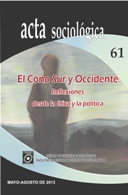Ethic, mystic and politics in Ezequiel Martínez Estrada y Leopoldo Zea
Main Article Content
Abstract
The paper presents a counterpoint between the works of Ezequiel Martínez Estrada (Argentina, 1895-1964) and Leopoldo Zea (México, 1912-2004), focusing on two basic dimensions: (a) their conception of the nature of the links between the intellectual and politics, and (b) the ways they frame the relationship between the realms of the given, the imminent and the desirable. It sets up the following hypothetical framework: 1) in both cases we are witnessing a critical appraisal of the given that, in terms of self-perception, gravitates toward an identification with the figures of the preacher and the therapist; 2) with respect to outlining the desirable, in both works there is a clear movement, on the one hand, to combine an undeniable urge towards modernity with an undeniable fascination with Gemeinschaft-type realities and logic, and on the other, to preserve a certain tension related to the transcendental plane, and 3) in each case the movement unfolds in its own way, resulting in different types of association with symbolic motifs and also, very notably, practical implications.
